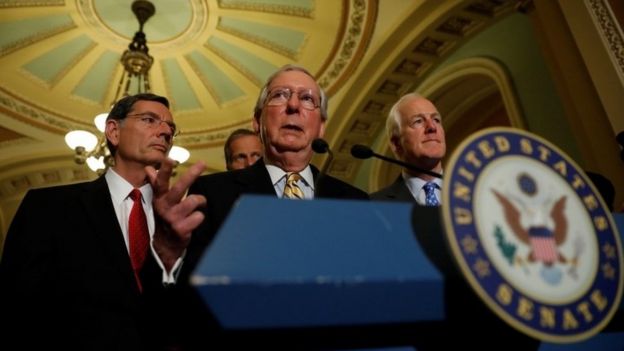United States News
See other United States News Articles
Title: Republican healthcare bill fails in US Senate (in spite of McCain & Pence YES votes)
Source:
BBC US & Canada
URL Source: http://www.bbc.com/news/world-us-canada-40723060
Published: Jul 26, 2017
Author: BBC
Post Date: 2017-07-26 16:19:48 by Hondo68
Keywords: None
Views: 2410
Comments: 11
The US Senate has rejected a Republican plan to replace President Barack Obama's signature healthcare policy. The 57-43 vote defeat marks the start of a days-long debate on a sweeping overhaul that critics fear could deny healthcare to millions of Americans. The Better Care Reconciliation Act (BRCA) was crafted over two months but attention now turns to other options. President Donald Trump has urged senators to pass a bill, without indicating which one he supports. A repeal-only bill, which would consign so-called Obamacare to history in two years, to give time to Republicans to devise a replacement, could be debated and voted on next. Poster Comment: The Democrat Republican Party's love for Senator McCain knows no bounds, but the Trump GOP's latest effort to expand and enhance Obamacare has failed.
John McCain returned to the Senate to applause
Post Comment Private Reply Ignore Thread
Top • Page Up • Full Thread • Page Down • Bottom/Latest
Begin Trace Mode for Comment # 1.
#1. To: hondo68 (#0)
Does "stripping" 22 million of health insurance mean they would no longer be forced to buy it?
#2. To: Pinguinite, Medicaid, Medicare, Part D druged voters (#1)
Sort of, but we still have to pay taxes to provide healthcare for everyone. Someone's got to pay for government mandated socialized medical care, and it's us. They need to go back a lot further than Obamacare and get rid of government meddling which drives the costs up, stifles innovation, and ultimately yields expensive lousy service. "No man's life, liberty or property are safe while the Legislature is in session." ~Gideon J. Tucker
Correct. This is also known as "losing" health insurance. Now, compare this to the 20 million who "gained" health insurance under Obama's expanded Medicaid program, despite the fact that they can't find a doctor within 200 miles who will accept Medicaid patients. But the CBO says they're covered ... which they are ... so therefore they are.
Top • Page Up • Full Thread • Page Down • Bottom/LatestThe non-partisan Congressional Budgetary Office (CBO) found the bill would strip 22 million Americans of health insurance over the next decade.
Replies to Comment # 1. Does "stripping" 22 million of health insurance mean they would no longer be forced to buy it?
#4. To: Pinguinite (#1)
"Does "stripping" 22 million of health insurance mean they would no longer be forced to buy it?"
End Trace Mode for Comment # 1.
[Home] [Headlines] [Latest Articles] [Latest Comments] [Post] [Mail] [Sign-in] [Setup] [Help] [Register]

